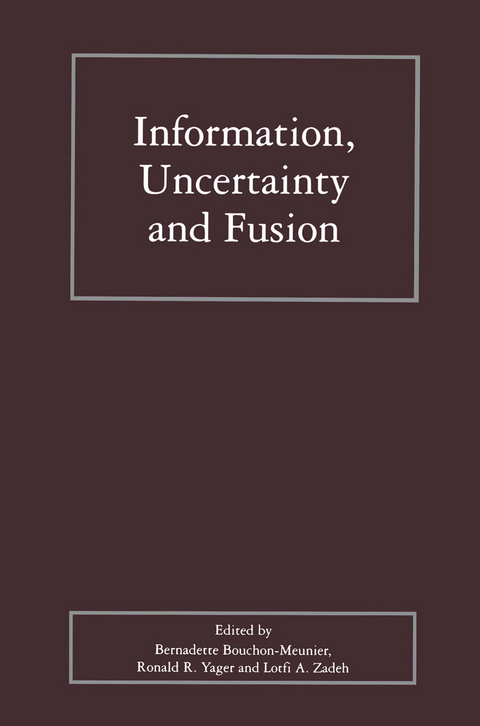
Information, Uncertainty and Fusion
Springer (Verlag)
978-0-7923-8590-5 (ISBN)
As we stand at the precipice of the twenty first century the ability to capture and transmit copious amounts of information is clearly a defining feature of the human race. In order to increase the value of this vast supply of information we must develop means for effectively processing it. Newly emerging disciplines such as Information Engineering and Soft Computing are being developed in order to provide the tools required. Conferences such as the International Conference on Information Processing and ManagementofUncertainty in Knowledge-based Systems (IPMU) are being held to provide forums in which researchers can discuss the latest developments. The recent IPMU conference held at La Sorbonne in Paris brought together some of the world's leading experts in uncertainty and information fusion. In this volume we have included a selection ofpapers from this conference. What should be clear from looking at this volume is the number of different ways that are available for representing uncertain information. This variety in representational frameworks is a manifestation of the different types of uncertainty that appear in the information available to the users. Perhaps, the representation with the longest history is probability theory. This representation is best at addressing the uncertainty associated with the occurrence of different values for similar variables. This uncertainty is often described as randomness. Rough sets can be seen as a type of uncertainty that can deal effectively with lack of specificity, it is a powerful tool for manipulating granular information.
Information.- Revision by Translation.- Ambiguous Implications in Knowledge-Based Systems Described by Entity-Characteristic Tables.- Functional Dependencies and the Design of Relational Databases Involving Imprecise Data.- A Query Construct for Paraconsistent Databases.- Fuzzy Classifactory Object Recognition for Crisis Detection.- An Approach to Using Degrees of Belief in BDI Agents.- Representation of Comonotonically Additive Functional by Choquet Integral.- On Lower and Upper Approximation of Fuzzy Measures by k-Order Additive Measures.- Generated Fuzzy Quantifiers and Their Orderings.- On Neurofuzzy and Fuzzy Decision Tree Approaches.- A Fuzzy Extension to a Temporal Parsimonious Covering Theory.- Uncertainty.- Probabilities of Future Decisions.- Representations Issues for Risk Scenarios.- Zero Probabilities in Stochastical Independence.- Computing the Probability of Formulas Representing Events in Product Spaces.- Uncertainty Handling for Distributed Database Integration and Knowledge Discovery.- A Rule-Based Language for Probabilistic Reasoning.- Deriving Possibility Distributions from Data Sets Using Confidence Intervals of Probabilities.- Fuzzy Random Variables-Based Modeling with GA-P Algorithms.- A Seasonal Streamflow Forecasting Model Using Neurofuzzy Network.- Allowing Imprecision in Belief Representation Using Fuzzy-Valued Belief Structures.- A Transformational Approach to Fuzzy Propositions.- Four-Valued Logics for Reasoning with Uncertainty in Prioritized Data.- Fusion.- A Mathematical Model for Fuzzy Connectives and its Applicationto Operators Behavioural Study.- Invariance Properties of OWA Operators.- Aggregation Operators as Similarity Relations.- Semantic Meaning of Fuzzy Control Models and Heterogeneous Aggregation Operators.- Maxative Fuzzy Preference Structures.- Directed Possibilistic Graphs and Possibilistic Logic.- A Logic of Supporters.- Building Argumentation Systems on Set Constraint Logic.- Genetic Fuzzy c-Means Algorithm for Automatic Generation of Fuzzy Partitions.- Fast Dempster-Shafer Clustering Using a Neural Network Structure.- Distribution of Contradictive Belief Masses in Combination of Belief Functions.- Relationships Among Ordinal Relations on a Finite Set of Events.
| Erscheint lt. Verlag | 30.9.1999 |
|---|---|
| Reihe/Serie | The Springer International Series in Engineering and Computer Science ; 516 |
| Zusatzinfo | X, 460 p. |
| Verlagsort | Dordrecht |
| Sprache | englisch |
| Maße | 155 x 235 mm |
| Themenwelt | Informatik ► Theorie / Studium ► Künstliche Intelligenz / Robotik |
| Mathematik / Informatik ► Mathematik ► Allgemeines / Lexika | |
| Mathematik / Informatik ► Mathematik ► Angewandte Mathematik | |
| ISBN-10 | 0-7923-8590-X / 079238590X |
| ISBN-13 | 978-0-7923-8590-5 / 9780792385905 |
| Zustand | Neuware |
| Haben Sie eine Frage zum Produkt? |
aus dem Bereich


